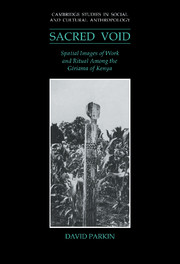Book contents
- Frontmatter
- Contents
- List of illustrations
- Preface
- Introduction
- 1 Fantasies of the west
- 2 Western Kaya, sacred centre
- 3 View from the west: cattle and co-operation
- 4 From west to east: the works of marriage
- 5 Spanning west and east: dances of death
- 6 Alternative authorities: incest and fertility
- 7 Alternative selves: invasions and cures
- 8 Coastal desires and the person as centre
- Conclusion
- Appendix 1 Three ecological zones and demographic features of southern Kilifi District
- Appendix 2 Giriama kinship and affinal terms
- Appendix 3 Giriama cattle terms
- Appendix 4 Giriama patri-clan structure
- Bibliography
- Index
- Cambridge Studies in Social and Cultural Anthropology
4 - From west to east: the works of marriage
Published online by Cambridge University Press: 03 November 2009
- Frontmatter
- Contents
- List of illustrations
- Preface
- Introduction
- 1 Fantasies of the west
- 2 Western Kaya, sacred centre
- 3 View from the west: cattle and co-operation
- 4 From west to east: the works of marriage
- 5 Spanning west and east: dances of death
- 6 Alternative authorities: incest and fertility
- 7 Alternative selves: invasions and cures
- 8 Coastal desires and the person as centre
- Conclusion
- Appendix 1 Three ecological zones and demographic features of southern Kilifi District
- Appendix 2 Giriama kinship and affinal terms
- Appendix 3 Giriama cattle terms
- Appendix 4 Giriama patri-clan structure
- Bibliography
- Index
- Cambridge Studies in Social and Cultural Anthropology
Summary
The blessed and the unblessed
In the old days, women would not leave their husbands because they would have been blessed (ku-haswa) at their marriages. This is like being given an oath, for if a wife did leave her husband for another man, she would die or would never be able to have children. But nowadays many marry in a Christian church and so do not get blessed, and that is why more women leave their husbands.
This view of a changing situation was expressed by an old man raised in the cattle area but many years resident in the coastal palm belt, who saw the difference between the two areas as responsible for the change: with traditional marital stability still a characteristic of the pastoralist west, and recent instability that of the farming east.
From the cattle area cases are given which provide another perspective on blessed marriages: a man who follows the customary procedure of approaching a girl's parents for her hand and whose father takes a gift of palm wine for preliminary negotiations concerning bridewealth(hunda), has a fruitful marriage which becomes blessed in the course of the customary bride wealth payments; another man who simply chooses a girl from a group of dancers at a funeral but does not consult either his own or her parents, does not have a blessed marriage and so remains childless.
- Type
- Chapter
- Information
- The Sacred VoidSpatial Images of Work and Ritual among the Giriama of Kenya, pp. 84 - 104Publisher: Cambridge University PressPrint publication year: 1991
- 1
- Cited by



